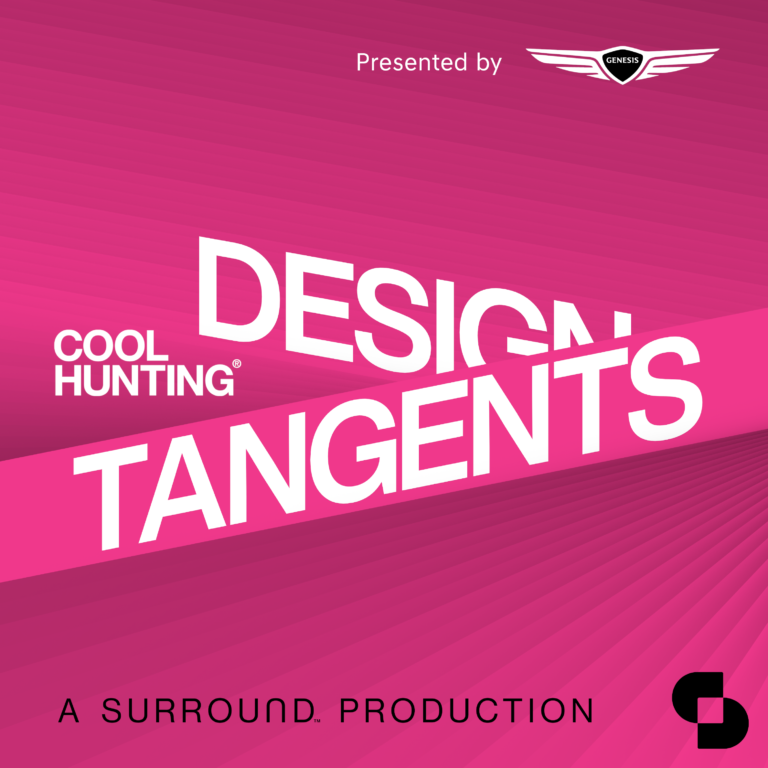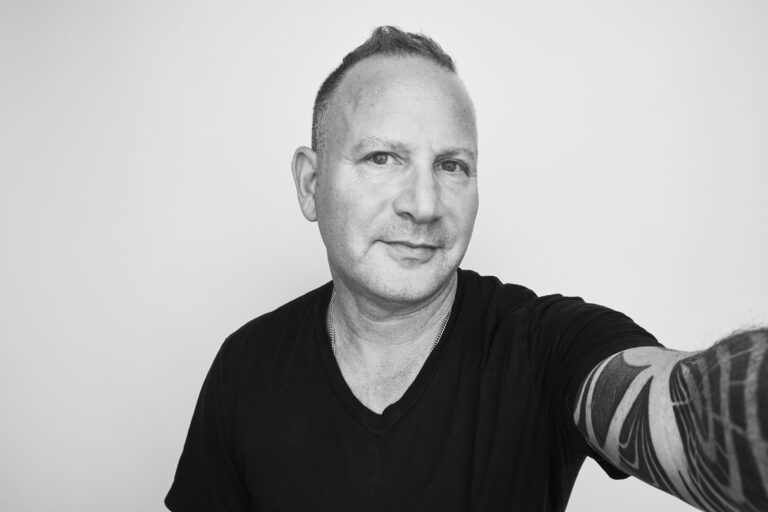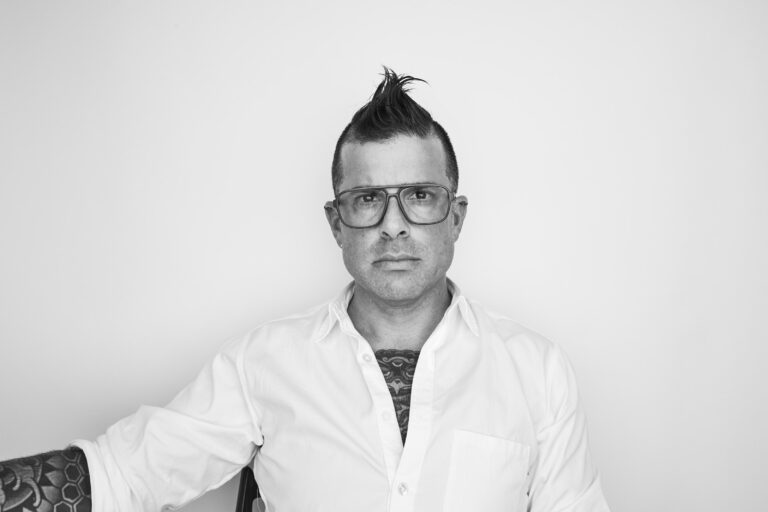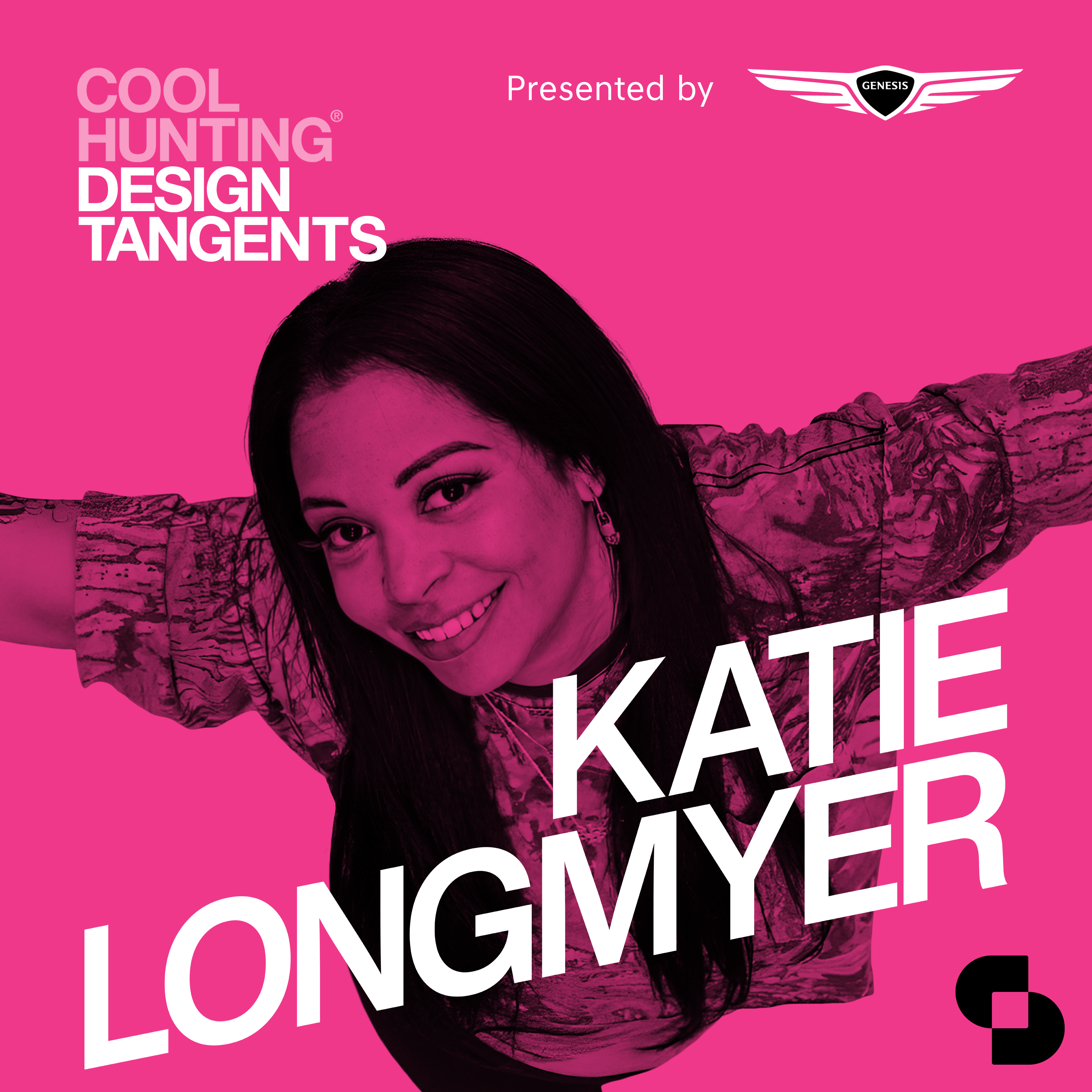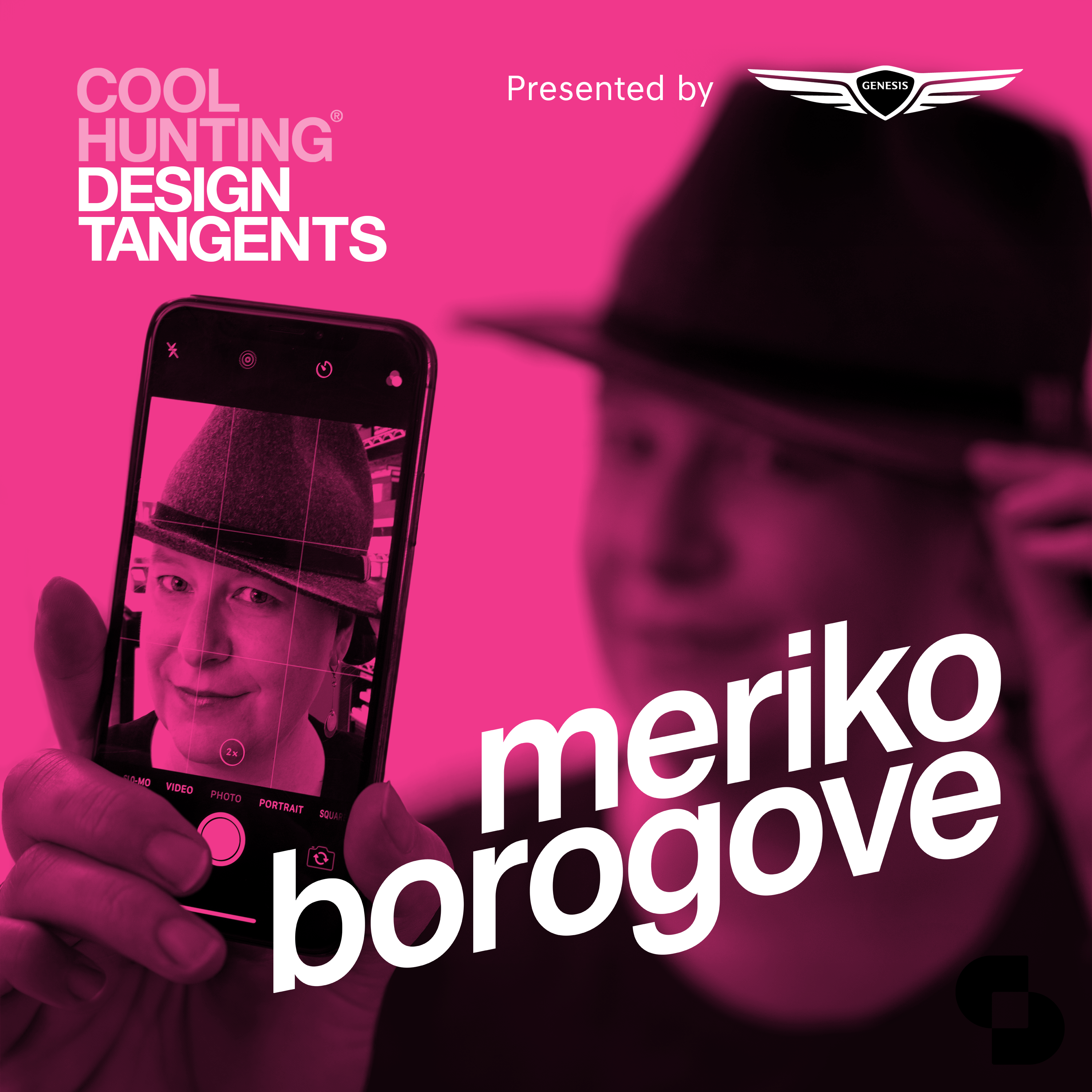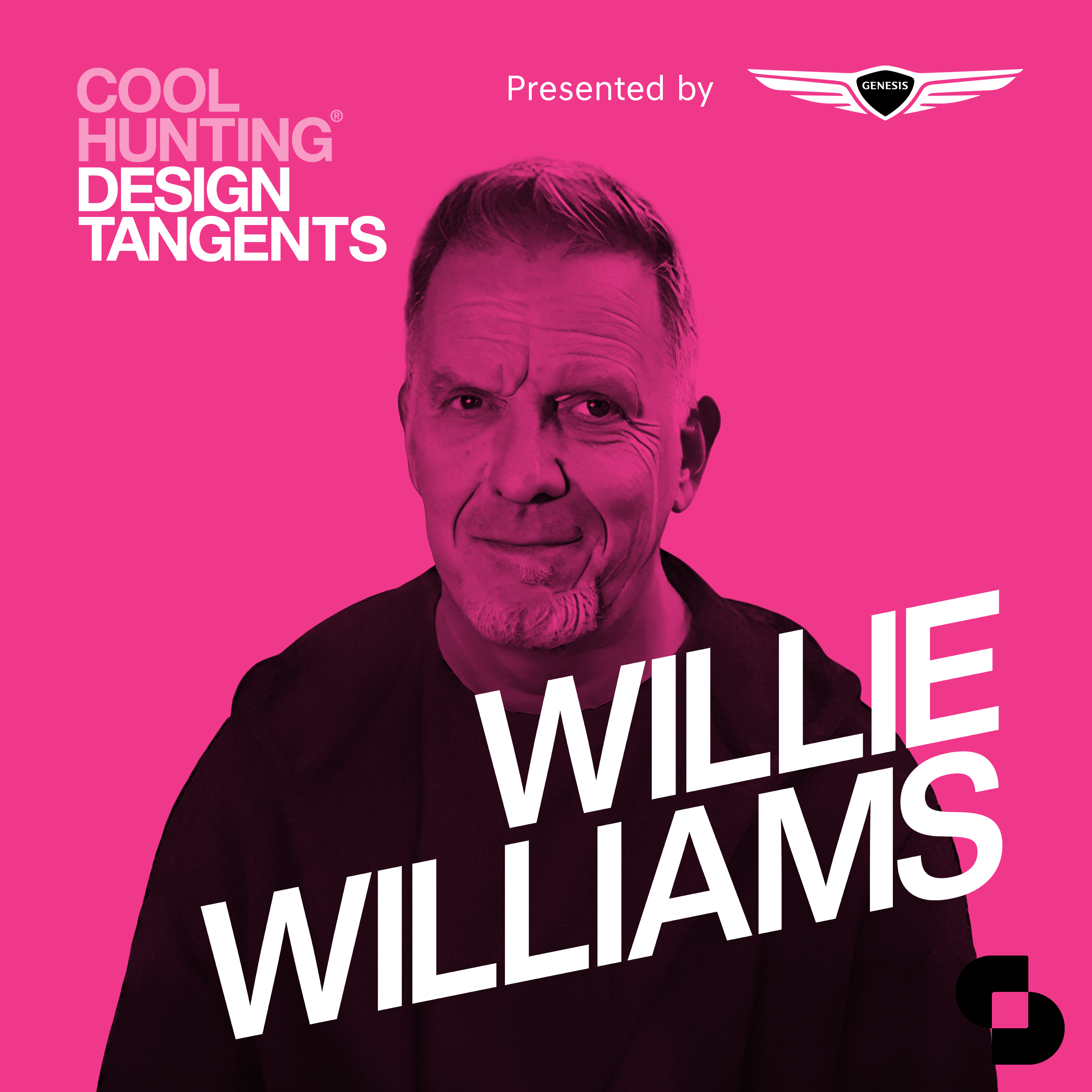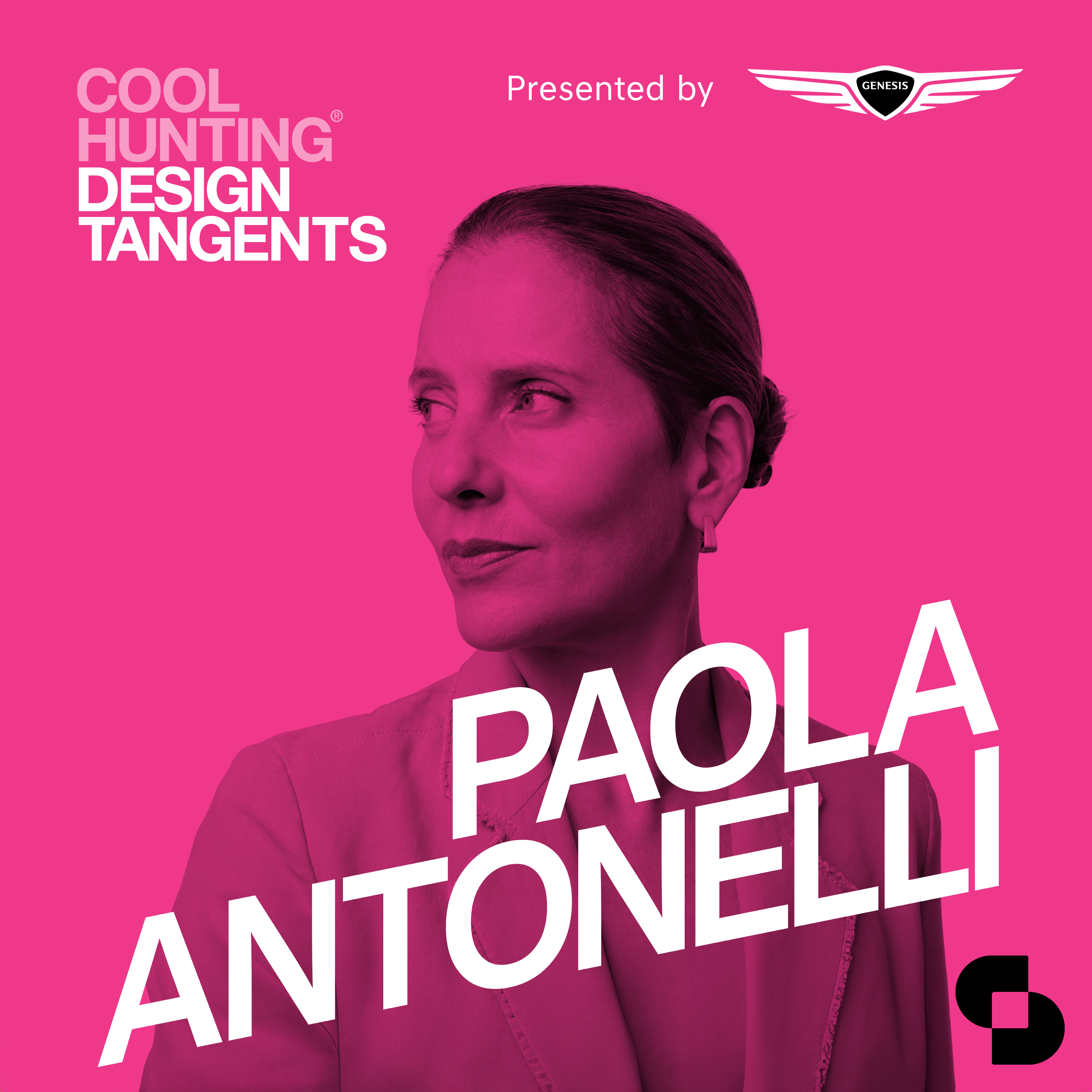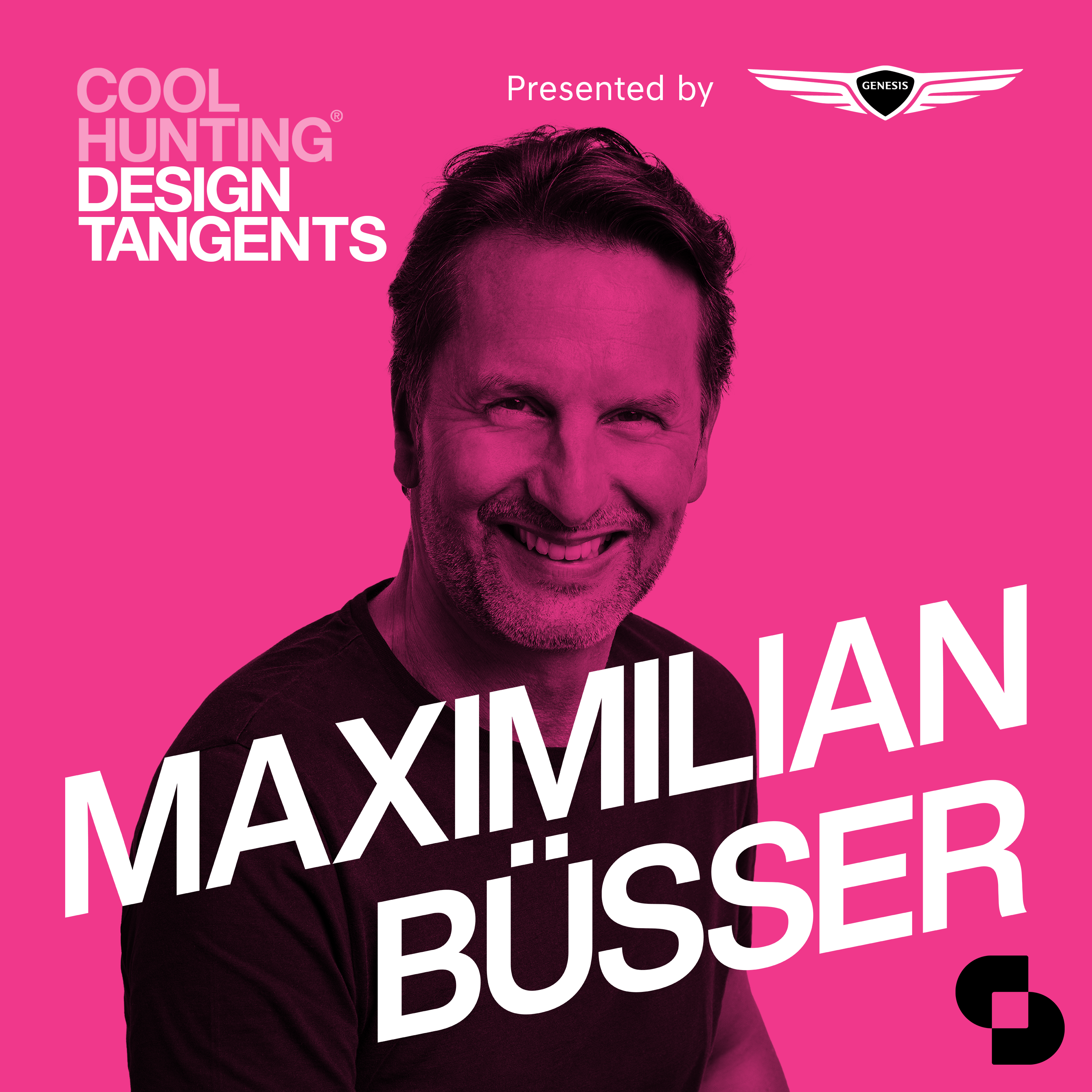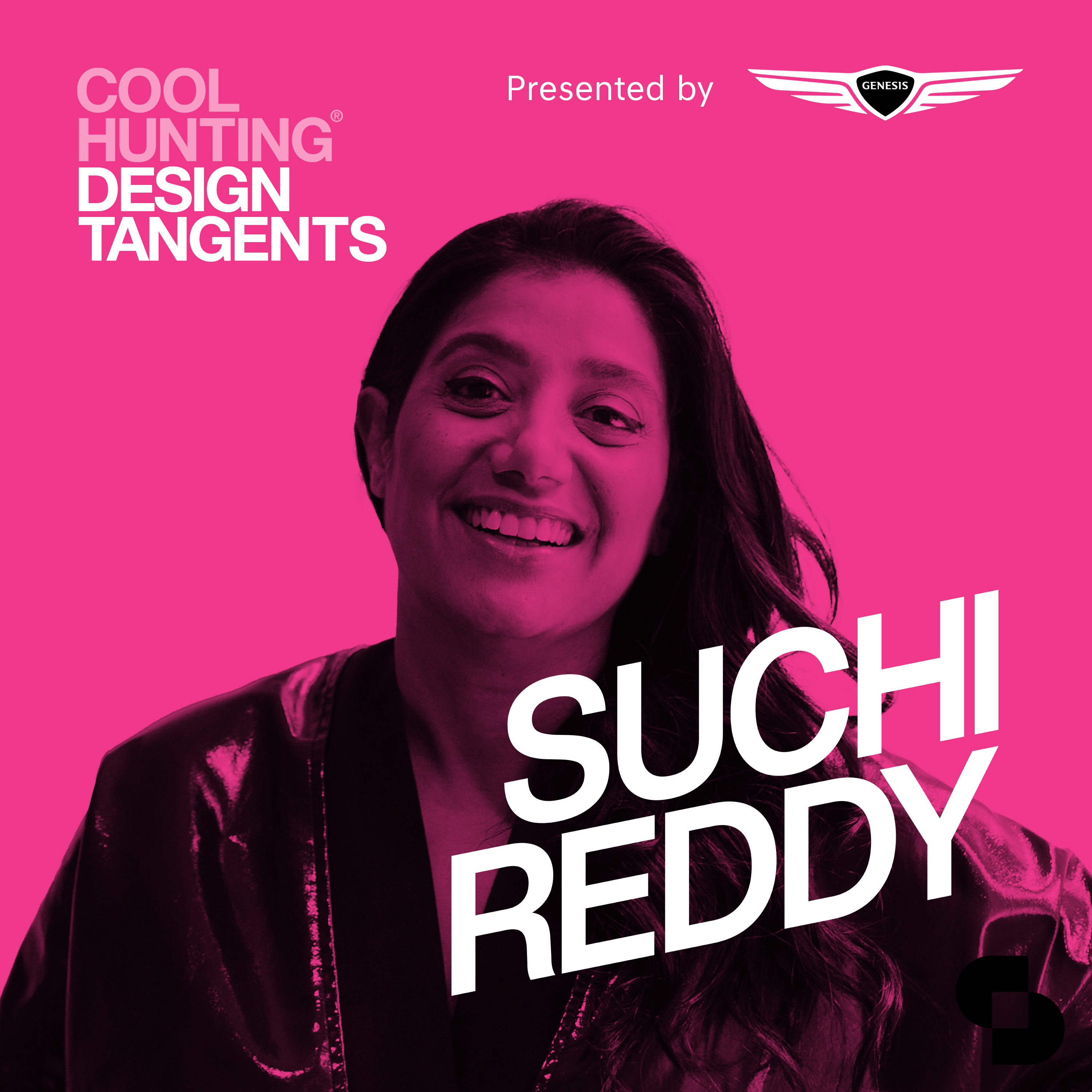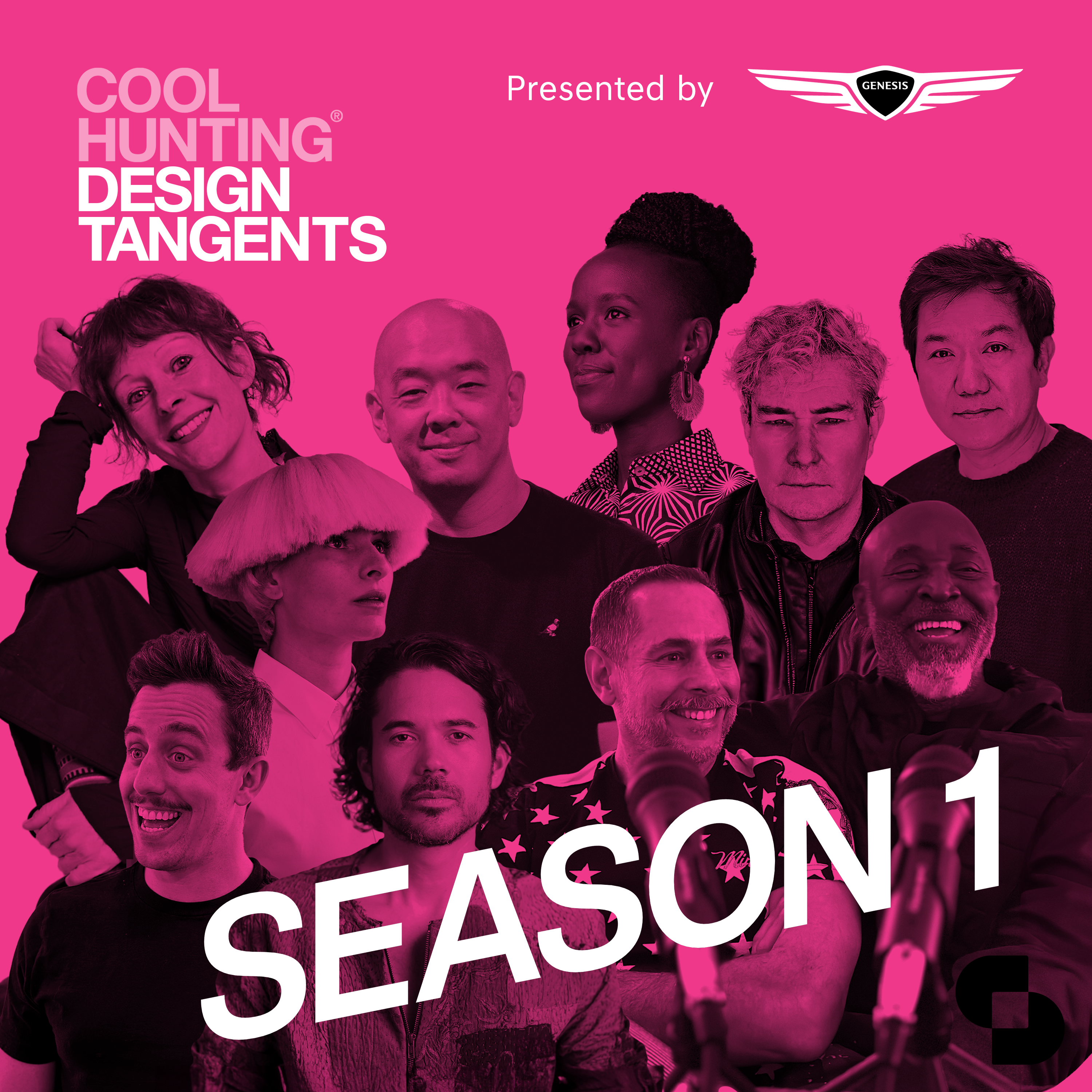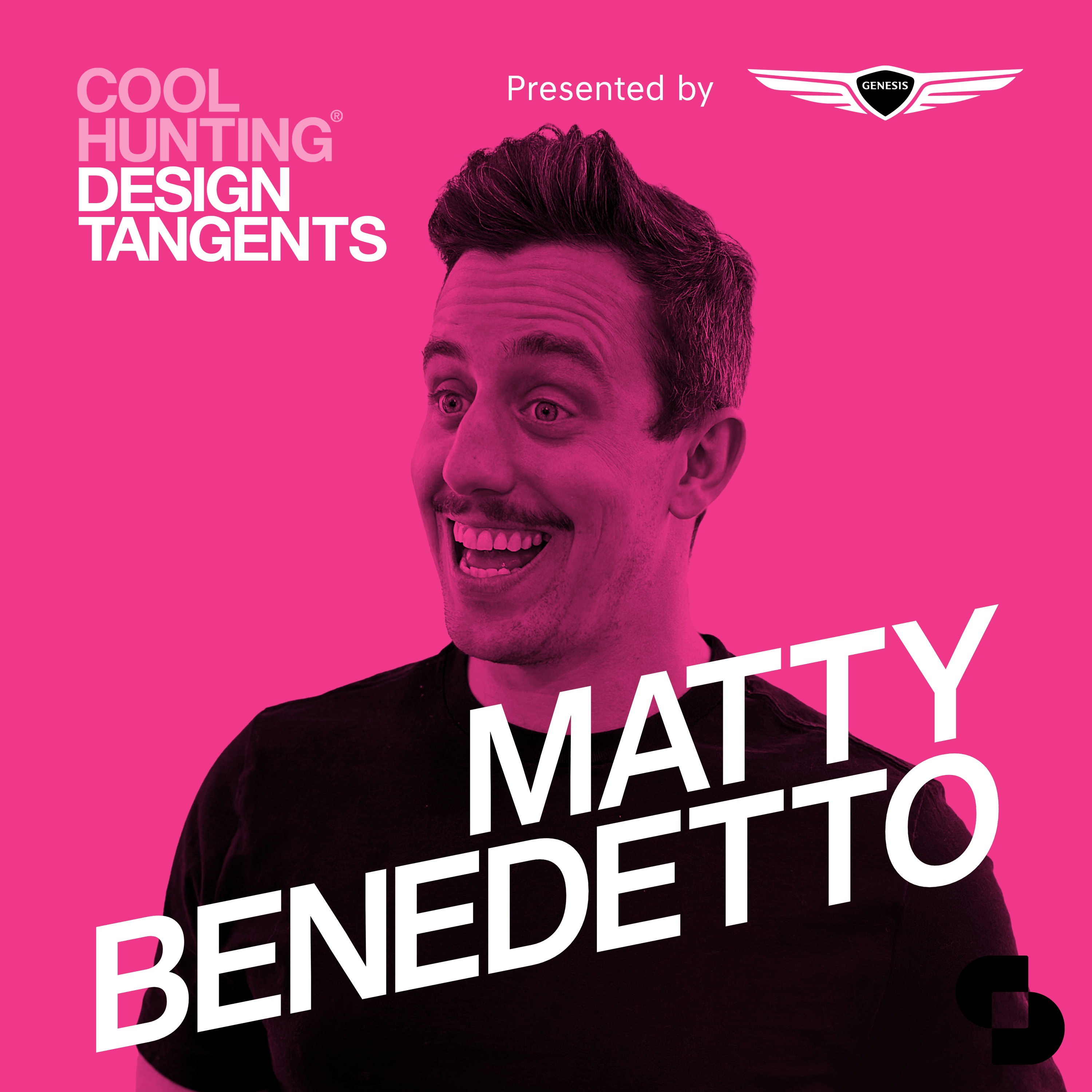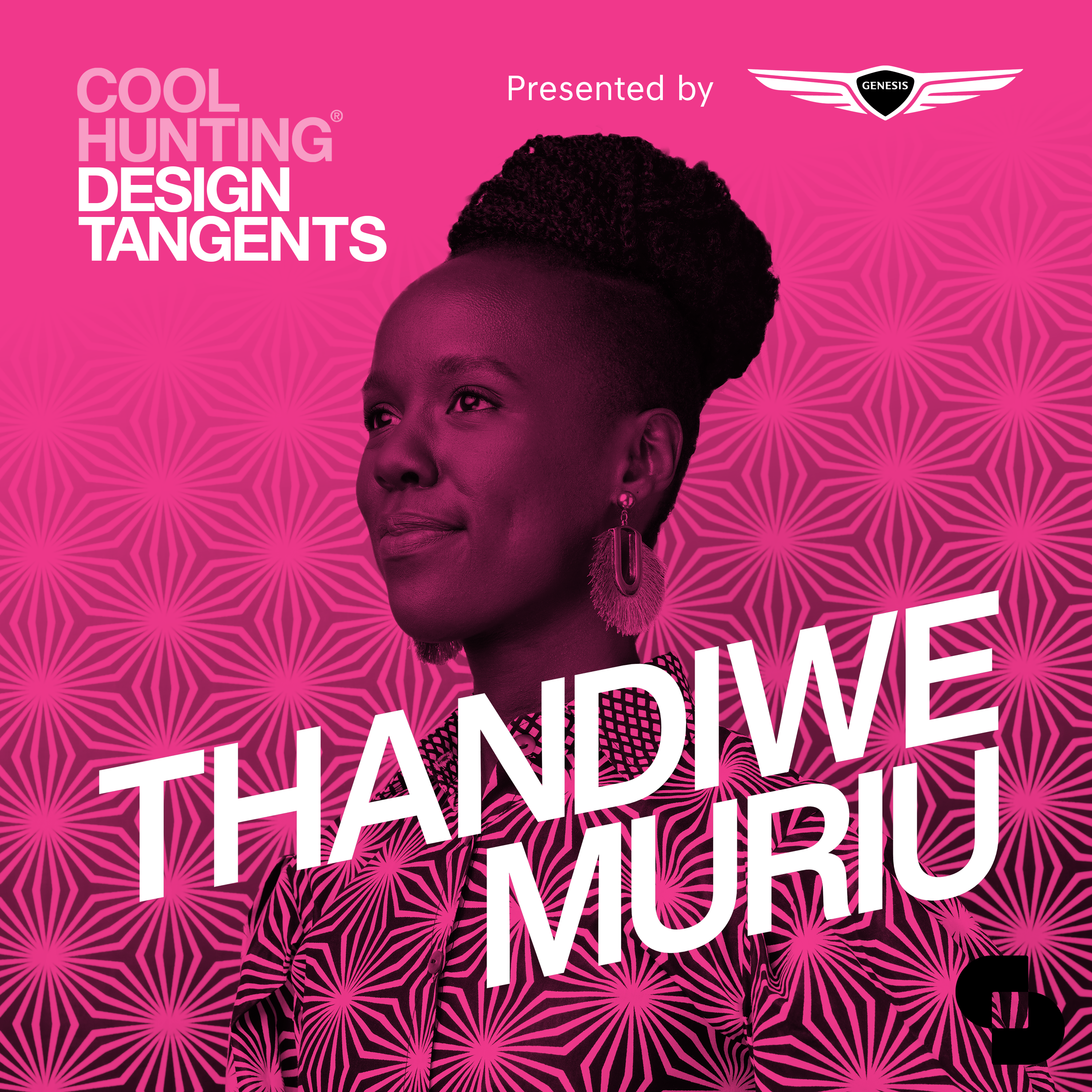A master interviewer, Zane Lowe was once called “Pop’s Unofficial Therapist” by the NY Times. He’s Apple Music’s head of artist relations and the lead anchor for Apple Music 1 Radio. Flipping the script and interviewing the interviewer, Josh and Evan chat with Zane about the importance of curiosity, holding space for conversation and finding the balance between diligence and instinct when it comes to preparing for his work. Full of stories and some deep personal moments, this episode is an exploration of how to design an interview and ultimately what we learned was so much more.
This episode was produced by Rob Schulte.
Design Tangents is presented by Genesis.
This transcript was generated by an automated service. In some cases it may be incomplete or inaccurate due to inaudible passages or transcription errors.
Zane: [00:00:00] where I ended up sort of in terms of my passions and stuff
was just born out of
wanting to
find a place that I could immerse myself in,
where I felt understood, even if it was just me and the artist
I was
listening to.
like, when I was on my own at home and I put my Depeche Mode records on,
no one could judge
me.
It was
me and Dave Gahan and Martin Gore and Alan Wilder and, Alan Fletcher and
that was it.
Josh: Welcome to design tangents, a podcast from cool hunting,
exploring creative processes and inspirations that drives change makers. I’m
Josh Rubin.
Evan: and I’m Evan Orensten. Josh, I’m so excited that we’re kicking off our
second season. You know, one of the things we learned from our first season is
the value of having just a little bit more structure to our interviews.
You know, some of our conversations were really great. As an interview, but
they weren’t necessarily great as a podcast.
We, of course, want things to be fluid and we want to live our name, which is
tangents, right? Design tangents. We want to go off on those juicy tangents, but
a little bit of structure, I think helps give and guide the conversation a little bit
more.
Josh: It’s funny to hear you talk about structure F you’re not usually the
structured one, you tend to be the more fluid one. I tend to be the more
structured one.
Evan: Very true.
Josh: Thinking about this season though, and thinking about this first episode
of design tangents, season two structures, a very relevant topic. We had the
opportunity to sit down with Zane Lowe in his studio at Apple music in LA.
Evan: Not going to lie, Josh, I was really intimidated when we got the
suggestion that Zane come on the podcast. Um, you know, he’s the first person
we didn’t really know at a time and weren’t friends with, and it was a little bit
intimidating,
for those of you that don’t know Zane, he loves and lives music.
It’s his [00:02:00] passion. He’s a musician. He’s a radio and podcast host. He’s
one of the people who created apples beats one back in.
2015, um, and now that’s just called Apple Music One, you know, and he’s still
there after whatever that is, eight, nine years. And in addition to his many roles
he also heads up artist relations for all of Apple Music.
So it’s, he’s a big deal.
Josh: he is a big deal. And
to me, he’s, I guess what I’m most inspired by with Zane is that he’s an
absolutely brilliant. interviewer.
the way he engages artists is so impressive. When we were interviewing him,
we talked about many different things and there’s a through line about balance.
And one balance point is between diligence and instinct.
Evan: It’s true.
Josh: And Zane talked a lot about that balance point between diligence and
instinct.
And,
You know, of course in the context of how he prepares for an interview,
Evan: really good to have that diligence and I loved when he was talking about
Really walking in, having all the information, having the background, having
done the research, having it all there with you, having a template,
Josh: the structure
Evan: and having the structure, but, but then you walk in and you just feel the
room and that’s when you decide whether or not you’re going by the book, by
what you have, or whether you’re just kind of winging it based on the vibe of
the room.
And that was a really great thing to learn from him.
Josh: I feel like
we do that a bit. We definitely read the room.
and
And I think that it was really valuable to hear Zane talk about how Sometimes
he’s prepared, sometimes he has a structure, and sometimes he just walks in and
is just open and ready to see where the conversation
is go,
Evan: [00:04:00] conversation
Josh: But he wasn’t always that in touch. Getting there was a journey, and
sometimes a struggle, which he candidly shared with us. We also talked about
pattern matching. And pattern breaking, another topic near and dear to us and
our work at cool hunting.
Evan: We really covered a lot of ground, Josh, and I think we shouldn’t
summarize any more of it and let’s just jump right into it and talk to Zane.
Josh: All right. With that season two, episode one of design tangents with Zane
Lowe.
Evan: do you
find balance? You’re a really busy guy. Yeah,
Zane: Yeah,
it’s,
a, it’s a great question, on a day like today. Cause I don’t have it today. You
know, I got
in LA, I’m dealing with three different things that are related but unrelated.
They’re related in the sense that they they’re, they’re connected to my to where I
work, but they’re unrelated to each other.
Um, and each of them are requiring quite a
lot of, a lot of, um, attention and urgency and
um, thought and
all good problems, but they need solutions and I gotta figure them out.
And then,
You know, it’s a it’s a really intense time for, for our kids Cause one’s in senior
year trying
to
figure out his college move and the other ones, you know, so there’s always
stuff going on in
the family house,
when, you
know, and so
It’s all good stuff, but I mean, yeah, the balance is pretty off today, and I think,
so, it’s a great question for a day like today, because if you got me on a day
where I was,
like super
balanced, I’d have some really thoughtful, like, well, you know, it’s just, it’s a
process, you use your tools,
and experience
Josh: blah, blah,
Zane: but I think, honestly, the, best answer I can give today, which is
probably
the, truest and most honest answer, is you just got to be kind to yourself.
Josh: to yourself.
You
Zane: You just got to allow yourself the
space to know that
everything’s not quite in order at the moment, it’s not balanced, um, And don’t
try to force it into a, into, into some shape that isn’t ready
to
Josh: to
Zane: itself.
focus on the things that you can
Get closer to [00:06:00] resolving at the moment, just focus. Like, okay,
well today I’ll probably only get this
done. just try not to be too hard on yourself. trying to fix 10 things at once, is
what I’ve really learned
how to
do. Um, that was how I was, I would be like, well, I’m always trying to fix
everything. and it’s like, you know, you know what, sometimes things just play
themselves out the way they should and you’ll have much better, a better idea on
how to deal with it then. So.
yeah, just try not to, um,
uh, be
hard on myself
if it’s not all going according to some perceived plan that doesn’t actually
exist,
Josh: some
Zane: right.
There’s no plan.
Josh: you hold space for people brilliantly, right?
You have so many artists that are very comfortable sitting with you and talking
to you. And from the perspective of a listener, it just seems like it all happens
and it’s all instant. Um,
Zane: so
Josh: do you have some sort of. Something that you do to transition into a
moment to be able to be present and then what are your thoughts on how, or
what is your practice of holding space for people to be able to have such
interesting conversations?
Evan: Well
Zane: you, and that’s
those are both great questions. I mean I was
terrible,
at being present when I was younger and and only up until very recently have I
felt like I’m actually in practice on that. Um,
Evan: that. Um,
Zane: know, I’m. and it’s a practice for sure, and it will be forever, and
I
think that, you know, it’s, it’s, it’s, you’ve got to, that’s where self awareness
comes in handy, I think, when you’re like, hang on, you’re getting ahead of this.
Josh: If this isn’t a
Zane: If this isn’t the
reality of the
situation,
the
things you, that you can use in order to better understand
How to be your best self right now will be a value
to this scenario
right in front of you. Don’t try to
get ahead of those tools or get ahead of those, those situations or
those.
elements.
Josh: And, you know, I was,
Zane: I used to hypothesize all the time. I would, you know, I used to think
that, you know, like seeing around corners, meant figuring out what could go
[00:08:00] wrong.
And it’s actually not always the best approach. Sometimes it’s good every now
and then to sort of, if your instinct’s saying this doesn’t feel right.
then yeah,
nothing wrong with hypothesizing a bit. seeing what the angles could be, and
doing a bit of diligence in that space, just quietly
and quickly,
but um, and that goes across our whole life.
Um, certainly for me at work,
Evan: it
Zane: in handy because I have to think how the, cow, how we think here at the
company, but also how artists might react to something, so it allows us to
present the information in the most thoughtful way.
Um, that’s
just from years of speaking the artist language. And so
that’s where that kind of like, getting around the corner is, is, a, is a, um,
something I do, and I, and I work at it, but in my life, it, came down to the, my,
the therapy I’ve been doing, and, and the fact that I was really
still
in a very anxious space, and my therapist realized that, uh, you know, the best
place for
me, to best way, and the best place for me to start to get past that, which had
become just a very sort of Every day part of my life, anxiety, I just like to live
with it, physical, mental, spiritual, emotional anxiety, like, it didn’t matter, I was
just, um, this is me now, I guess
this is it.
He’s like, no, no, no, no, no, no. that’s
not the case. There’s things we can do to make,
to
to, to quiet those things down. And it really all just comes down to being in the
present moment. So, he has been really instrumental in helping me to sort of
better understand how to know when I need to just,
block
out the left and the right and just stay in the center of the situation.
and Just try to find the center of it
and just
be present. And again, it’s a practice. It’s like I’m, I’m really in my infancy of of
it, really, in a way. I’m, I’m learning the early stages of it,
but I’m
aware I’m learning the stages. In terms of how it applies to me in a
sort of
conversation space,
it’s about
reading.
The energy of the room
and trying to
best understand through years of doing it, what the body language or
what the [00:10:00] the way that
the person’s moving before you even speak.
Am
I coming in hot? Am I coming in
gentle Is it
casual like we started?
Does
it require formality because this person needs structure?
Josh: because
Zane: this is a job for them today because that’s what’s making them get up to
do it because No structure is just like, that. they’re not
in a headspace to
deal with no structure. Like, we’ll get to no structure once we start, but they
need to know that they’re in a structured place, Cause that’s also a tool.
and so it’s all different. Everything, every situation is different. And I think that
I came in with far more of, I’m sorry it’s a long answer,
but
I want to make sure I answer
Josh: No, no, no, no. It’s, this is great.
Zane: That’s a two part question too,
Josh: Yeah, yeah, yeah. It’s a lot. It’s a lot.
Zane: but I can, I can, I can finish by saying, you know, I used to, uh, come in
with far more of a sort of, um, template or a game plan that I would change
over
time.
And
now I, I really try not to do that. Like I had a conversation with someone
yesterday and I thought I needed to have a game and very quickly I realized that
That was not going to serve
Josh: purpose, and the
Zane: It’s purpose, and the best thing I could do would
be to
sit there and listen. And the best compliment I got afterwards
from somebody who’d been, who’d been on
set said,
you know, thank you for staying
Evan: In
Zane: the flow
and keeping it authentic.
And I thought, oh, well that’s, that’s
the best compliment
I could have got for what happened yesterday because It was a flow,
it was a flow
state of conversation, and there was no traditional structure to it,
and
it was brilliant, I loved it. I don’t know if I could have done that five years ago,
And, you know, I think
I
could, I would have
just been like, just get
back into my framework, like, I’ve got this framework, like I know you’re going
elsewhere, and you want to go talk
about this, but I’ve sort
of got to hit these beats. Got to hit what? Like, at the end of the day, it is what it
is, a human experience, that’s
all you can come away with is a valuable human experience, and
if it’s
really good, you
have another one, you know?
Josh: I think, you know, Evan and I are both constantly finding this balance of,
okay, we have some, some preparation, some structure, but also want to be in
the moment and,
Zane: instinct and diligence, right? that’s, that, that’s
That’s the balance, I think, to a really great experience. is that you’ve done
[00:12:00] the work and
the diligence. And I
saw a vibe, even if I’ve listened to the music, I mean, I cannot talk to you unless
I’ve heard your music, you know, That, to me, is like research in one on one,
number one thing I got to do is to feel and I’ve said that before, but it’s true.
I have to feel Feel the music. I have to know the intention from my perspective
of the music, not just the notes and the melody, which is how I used to do it. I
used to be like, oh the drums are great. How’d you get that sound?
That’s cool
And I still am interested in that, but it’s not going to, I’m not going to learn
much more about drum sounds.
Like, And that’s not to be disrespectful to the process of recording drum sounds.
There
are people still need to master the mixing of that, but I’m not going to be able to
absorb more information on that because I’m not a master mixing engineer.
So
at some point it’s going to be like, I go in the room, I put the mic and I got the
drum sound, it
was cool.
There’s a
funny story how I got it. but I’m like, I kind of heard that story before.
someone said something to me very recently which was amazing, which was,
uh,
have
to improvise my vocal performance to some degree
because
it’s all feeling. And I said, how do you realize you got that feeling when you
listen back to the mix? And she goes, because I’m searching for the feeling
again, not the performance.
And
I thought that was so cool. Like she doesn’t listen back to it and go, Oh, great
notes, great pitch, excellent tone. she’s like, is the feeling still there?
the diligence is to understand the music and understand and try to get the
feeling.
And then the instinct is to do what we’re doing now, which is to just, I don’t
know what’s coming next to
Josh: if that
Zane: know what I
Evan: we’ve been doing content for 20 years, but it’s pretty recent that we’ve
kind of come to this.
The way we say it is really we’re pattern matching, right? We’re looking for
things typically that fall outside of the patterns, right? Um, so when we’re
scanning a different category, whether it’s, you know, hospitality or spirits or
automobile design or whatever, we’re like, what sticks out to us? Like what is a
now, you know, um,
Zane: popping
Evan: And in some ways I think music is, I’m guessing at least the way you’re
looking at it is what sticks out, like [00:14:00] what’s standing out to me right
Zane: now
Evan: and what’s different about this
Zane: artist.
Mm.
Evan: and are they connected to their work or are they disassociated
Zane: their work?
Evan: And they’re just kind of like a machine. I
Zane: I love the way you put that and it’s funny because I think music often is,
is, doesn’t get put in the same
Evan: descriptive
Zane: category or as,
as some of the other arts in that sense.
It’s been so successfully commodified
and commercialized
and distributed as
a
packaged product that people
forget that it’s actually not the intention, most of the
time,
Josh: the
Zane: that’s not
to say that there aren’t great successful business models that, that do templatize
in a really unique
way.
And
Evan: And
Zane: we,
you know, as human beings, we’re drawn to those things because they make us
feel like
something.
We want more of
Evan: it.
Zane: Right. Um, I haven’t just eaten one French fry in my whole life.
Evan: life.
Um,
Josh: Thrones in a very long
Zane: Um, but I think that, um,
I’m really dedicated to
at this point in my
life,
Josh: done the biggest
Zane: having done the biggest radio
show, for new music on the
planet, which is what the Radio one show is, hands down, I mean, there’s no, no
bigger. showing that time slot, just by the very nature of this Radio one on the
BBC covering the entire UK with that level of influence. And at that time it was
massive. Um, I’m sure it still is, but I mean, for me, when I
walked out, I was
like, all right, I may not
get bigger
from a sort of singularity point of view than that. So what’s a bigger thing for
me? Like, where’s the bigger curiosity for me? Where, am, I going to get out in
the next phase of
my life?
And I knew it would get bigger from working at Apple from a learning curve
point of view and in
the areas I would never thought
I would ever go into and
understand hardware and
tech and software and services.
And the beautiful and that
that
very true
intersection between You know, technology and the liberal arts, it is 100 percent
what this company is, no question about
it. I can say from inside the whale now that that is what
it is
It is about, uh, from my perspective.
Um, so I’ve learned so much, it’s way bigger than
it was before,
but in terms of the radio and the conversation space and everything else, I’m
like, [00:16:00] hang on, this is actually a much
broader space for me to explore because I’m not just
driving
The
story of
Big new song out in six weeks.
big new song out of six weeks.
When you remove that,
Josh: then
Zane: like, what’s,
what, what is
all this about out here outside of that framework? And that’s when it got really
interesting. That’s when the conversation space was
like, what’s
driving
Evan: the
Josh: purpose here
Zane: of making this? Not,
what’s
the purpose of listening to it or releasing it or marketing it, but why is it being
made?
Who are you? And then it
was
like, wait, pop stars feel that too. It doesn’t just have to be Justin
Vernon,
or PJ Harvey or anyone else I consider to be the highest
of the high
Evan: in terms
Zane: of
Finding that, or SZA, finding that inner voice and going, Blah! There are pop
stars who strive for that all the time. And that’s an even more interesting
conversation because they still have to figure out what it means to an existing
infrastructure that is driving for success.
So, those are just two examples of like, where I’ve ended up in conversations
and
so
forth, and where it goes. And there’s so many more. And so it’s been the best
time of my life,
to your
point, of being able to identify What is unique and authentic about everyone’s
story? Whereas when I was working in the back in other areas I felt like I didn’t
have so much room to do
that because We
got two minutes to
make the song sound big Really?
We were all working for each other I mean the artists were working for the fans
who needed to get the music They got it from the labels who put it in the stores
and then to put them in the stores They can listen to us and we made them
aware of it And they went to the stores and bought the record and the label did
the and the artist It was all just big one swirl of industry right and that that’s all
kind of
It’s all
been dismantled now and it’s been carved up and distributed to people who still
care or just
very successful at it.
does it make sense?
Josh: does make sense. I mean, you’re, you’re, you’re describing the Like we,
we called out patterns as a, you know, as a, and, and our practice of pattern
matching. And, and kind of [00:18:00] what I’m hearing you talk about is, you
know, this, uh, one pattern or template, uh, which is more thinking, right?
It’s just, okay, this is, this is the job today. I’ve gotta got
Zane: I got the
Josh: announce this, get that out, whatever. And then the other pattern, which
is, which is more feeling Yes. And rooted in the breadth of. Experiencing
conversations you’ve had and the artists that you’ve talked to and the, and
maybe some of the patterns that you’ve kind of observed that help,
read the room or, or, or
Zane: it just opened me up, It opened me up
because I
Evan: had been
Zane: trained
to play records and talk to artists in order to to serve a purpose for the fan, for
where I work and for the industry and for the
artist, I was really just serving this And I wasn’t really asking myself, what’s,
what’s really interesting you? Like, where’s your curiosity?
and all of this. Not
as much as I am now. And that’s why, and I’ve said this many times, but I it’s,
it’s so important.
I’ve got to, I’ve got to shout out, but I’ll do it quickly, which is why when I got
told you don’t listen, that was the big thing for me because I’d been trained to
not really worry about the answer. I
was too
busy focusing on just getting it finished, getting it out and making the best
possible opportunity for the song I could.
Josh: Wait, when did that happen? When were you told you
Zane: I was, um, I was about a year into
building this with Ian and Julie and a few people, and Francis a few people
building this radio model at Apple. And then when when Ian,
your mutual
friend, departed,
had to kind of,
Be the person that would go and report the information
to,
Evan: right?
Zane: And so that was me.
it’s very steep learning curve and I, and I had to figure out what I was doing. and
It was affecting the things that I
would be hired to
do, right? I wasn’t focusing
as much on conversation. I
wasn’t as much in the
conversation. Like I’d show
up at the last minute and I’d be very respectful, I know the music, I’d know my
research, but I was really just kind of, I had my, I was also somewhere else, I
was also like, oh man, three hours I have this meeting, I don’t think about that.
And so, my friend who I worked with said, you need to talk to someone about
this, and you need to, because this is really your skill, like, this is a big skill, you
turn you back on this,
and it really alters the whole makeup of what drives you and what inspires you.
And if
you’re willing to do that, cool, but
I don’t [00:20:00] think you are.
So I went and spoke to a performance coach, someone who
works in athletics and
anything in the performance
industry, but it’s
athletics, high level,
um,
business, um, arts, actors, musicians, I think anybody who just wants to perform
at a high level that
feels like they’re stuck.
And I went and spoke to her and she just, she went and watched my stuff and
came back and said, you know, yeah, look, you’ve, you’ve got some real natural
ability and skills here that people are
drawn to,
but you don’t listen really enough
to what they’re actually saying
to you. And she gave me a bunch of examples of things that people had said that
I just kind of.
you know, driven on past, you know, and cause
I was
preoccupied and I wasn’t thinking about the moment.
And she
was like, um, you know, you keep
trying to protect
your, uh,
subject.
I don’t know why, but you just got to let them
be and let them say what they want
to say. And trust
that you’re going to be able to navigate that and be okay. It’ll be
okay.
It’s just a human experience, you’ll
be right. And
so that was the big thing
for me. And, uh, that’s when I was like, well there’s so much more I can talk
about now
because I’m open.
And it has just been so closed. I’d been really close. And it amazes me that I’d
gone as far as I’d gone. Especially in conversations.
If you look back at that Kanye interview, the first one I did, not the first one, it
was actually the second or third one I did, but I did this one where it was, it
went very, very wide. It was probably my biggest hit at the time. It was a very
big interview.
where he was talking directly to
camera about fashion,
and about what his ambitions were, and how he felt when he
didn’t feel respected and
understood. and
it was
very, and it went very far. and It was very long, broken up into four pieces.
That was the beginning of me just going, Whoa, like. I don’t know if I’m
actually good enough to do this right
now. And people talk about that interview all the time, but I was
out of my depth in that space, no question, and those that
know me know, and those that probably don’t still know cause I just watched it,
but it’s like, now I know that it’s like, all right, like I, I can have A conversation
with someone and we can really go there and have a great, a great, curious
experience.
you know what I mean?
Evan: Was that a really pivotal moment for you when you realized like, yes,
you’re good at the obvious. This album’s coming out. We’re going to talk to this
artist. We’re going to have a two minute segment. We’re going to get the things
we need and move on. To [00:22:00] really, I
being
Josh: a
Evan: connected to the conversation, having that presence.
Zane: there are times when people say things to me while they’re searching for
a
purpose for that observation, because we’ve gone there, like, we’re just open
now.
We’re not, we’re not trying to protect, we’re not trying to
put
guidelines around anything. It’s like, hey, when I made this, I felt this way, and
I’m willing to share that with you, that I feel
compelled in that moment to share as well,
because
I don’t want it to feel like Uh, therapy. My therapist doesn’t share his experience
to me when I’m sharing something with him.
He just gives me guidelines or lets me go. I want to be able to have a
conversation with somebody
about my experience,
not to the detriment of the fan or what, what the
subject is trying
to say. I know my place in this, because I want them to feel like, yeah, I get
Josh: it.
Zane: I
get it like I’m with you, we can have this conversation because I’m here with
you.
I’m not sitting here scratching
my head
going, I don’t know how to deal with this.
Every now and then I’ll hit some beats, you know, I’ll put some things down on
a text, you know, put a little timeline of one
or two words in
a row down just so I know I got some beats. but That’s cause it’s like
something’s crossed the line for me where I know
that, um, my
lack of process might not keep me secure in that moment, because I’m. super
psyched, You know, like,
Evan: Do you get starstruck?
Zane: yeah, all the time?
all the time,
if
I’m hoping someone’s going to be honest with me, not, I’m not expecting
revealing.
like I
don’t go into it and go, right, we need
to get deep on this. Like It
Josh: It
Zane: just be fun. Like, I have fun conversations with people all the time.
It doesn’t always have to feel deep. But honest is good.
Josh: Honest is critical. figure it out.
Evan: proactive are you? I mean, are there people that you’ve got your list of
like, I definitely want to talk to these people and you’re going to pursue them
versus just publicists and whatever hitting you up saying, Hey, this artist has
this
Josh: new
Zane: It’s both. It’s both. So the good news about the whole, the whole sort of.
community that we exist
in is that I guess
if you do it long enough and hopefully people like what you do and they feel
there’s some value to it they come to you and they say hey we’d [00:24:00] be
interested in you talking to this artist about this project and then you you get to
be really thoughtful about how you approach it yes no
never like, uh, more like, is this the right time? Or
would there be a better place for this conversation than than with me or
didn’t we just have one
Or, like,
where’s the where’s the intention of it you know but most of the time that When
we get asked to do things, I guess I’ve just done it long enough now that most of
the, of the sort of suggestions are kind of
very much in line with what we do.
So, that’s great. I mean, that’s beautiful. That’s when you sort
of get to 50 years old and you do this long enough, and you’re like,
great, like, I’m in a
really great spot here.
But,
to answer your question, um, I’m very grateful for that and love
the teams that we work with both here and outside
the company. It’s beautiful. It’s a beautiful process. But, um,
Josh: a beautiful
Zane: I am proactive.
Josh: I am proactive. I
Zane: I am proactive.
I don’t
Evan: wait. And
Zane: And I, and I
put in the groundwork. And I do it in very subtle ways.
And I work
hard at building trust even when I’m
not in the room.
if I’m a fan of you, if I listen to your music and it moves me. I’m so invested
from the conversation side of my life
that I, I
feel drawn to wanting to know about
what makes it work for you and who you are and what you’re willing to share.
Like I, It’s
a part of who I am. I’ve been doing it so long.
mean.
chased Post Malone down for
Josh: street. In
Zane: In a lot of different
ways. mean, that’s funny to say now because he does a lot of press, but back
then he did nothing. You know, he’d been, he’d had a rough intro. And he was in
the era of no conversation.
Evan: conversation. Look, it’s a combination, again, of instinct and diligence.
Knowing when it’s, if
Zane: Yeah, yeah, yeah, yeah, yeah. Look, it’s a, combination of, again, of
instinct and diligence. Knowing when it’s time to light it up.
but I’ll give you an example, which some people may think is cool. Some people
may think is trying too hard, whatever, but, but it’s worked for me. I’ve done
things on the air. where I’ve spoken really passionately about an artist or a song.
and Something’s really landed in the moment, not prepared.
I’ve just caught something that feels like I [00:26:00] actually really feel what
you’re trying to do here. And then after we’ve come off. I’m like,
Just
clip that up. And just send that to the label and let him know how I,
feel.
I could just let it be,
I
could hope someone was listening
Or I
could give them something to use
If
they want this person to open up and they feel it would be a great way to
communicate through fans and to better present the music.
They’ve
got one there in the canon that they can use.
or not.
So it’s, it’s just
finding ways to
let people know your intention is
good and that
you
understand what they’re trying to achieve and then
giving them the
space to come to their own
conclusion. I don’t chase people down. I Don’t, you know, try to sort of rush the
process.
But I certainly don’t sit on my hands
and wait for it to come to me.
I
See where there’s opportunities or shifts in the energy field and I’m
like,
all right, cool. What do I need to do? here to get a little more information to
make me better understand
how to make this something that is
approachable and even potentially enjoyable
Evan: For
Zane: person,
Evan: I want to talk more about manifestation of things. Um, As soon as we get
back from
Josh: this break.
That’s funny, I was, I was going to go to a break. Yeah. And queue up
something completely
different.
Evan: okay. Um, we can
As a kid growing up in New Zealand,
did you have any sense of
My near future, maybe it’s my far future, of things I’d like to see or do?
Zane: you No. No, I mean, how could, I, I could never have, you know, I was
so far away from where we are now, and it’s like, and not just in terms of
distance, but just in terms of like, the era I grew up in, like, it’s, I’m an eighties
kid, I’m obsessed with music, I’m obsessed
with the type of music that not many people are listening to or playing. And um,
I, I, mean,
Evan: Where’s
Zane: Who do I talk to about that? Where do I go? Where’s my, there’s no real
industry, there’s no, I can’t go knock
on someone’s door and say, Hey, would you mentor me? Like, I, it’s like,
Josh: like,
Zane: know, my dad was in radio, you could say that that was a part of my life,
my [00:28:00] dad was, he built radio stations and ran them, he wasn’t an on air
talent, he didn’t do anything like that, so he didn’t do interview people. He’s a
creative guy, I definitely got equal parts mom and dad in
lots of different ways, but
Josh: in
Zane: I think a lot of my, where I ended up sort of in terms of my passions and
stuff was just born out of
wanting to
find a place that I could immerse myself in,
where I felt understood, even if it was just me and the artist
I was
listening to.
This is very common amongst
music fans who
didn’t ultimately make it an art or make
it something more passionate. It goes beyond just enjoyment, it becomes
place that, uh, where you
are able to be yourself and just
like, when I was on my own at home and I put my Depeche Mode records on,
no one could judge
me.
No one could call me a loser or any of that shit.
It was
me and Dave Gahan and Martin Gore and Alan Wilder and, you know, Alan
Fletcher and that was it.
Manifestation as a concept really came about later in my life in my twenties,
late twenties because
Evan: I
Zane: I was
trying to understand what my life had become and where it could go.
it’s about feeling, it’s about feeling, it’s about feeling something, right?
And um,
so that’s really what I’m searching for, is a feeling.
I’m not a master manifester, I do think that that does exist, I do think there are
people, I mean, you can’t tell me that. Lionel Messi, It’s not just about
discipline. and It’s not just about hard work.
Those things are two things he’s put into his craft. He knows where the ball’s
going to go.
Josh: to go. He sees
Zane: He sees it. He’s already celebrating 10 seconds later
down the field. I’m sorry. It’s just, I just don’t, and I just think that it’s too,
It’s
too much of a singularity for us to not feel that everything around us
is shifting and moving
all the time.
So why can’t we move
with it and into it and figure things out.
I mean,
I just want to believe that. But, I like it when things come into my life and I
tend, it tends to be more sort of about health
and well being and
the well being of my family and things like that, um, more than like,
money.
you know, I don’t sit there and
go like, I want to feel like I got money. It’s more just like,
oh, I really want to make sure [00:30:00] everyone’s good. I want to feel like
everybody’s healthy.
I want to feel like our kids are fulfilled today.
It’s
kind of almost a form of prayer, I think.
and I love it, I love, I love the idea of it, I love the concept of it, I love the,
scene. I love the idea of, the concept of religion is beautiful, the idea of
community coming together and creating a shared experience that supports one
another and ultimately puts
Prayer
into something intangible and the hope that it makes life better is beautiful.
We just know it’s got complicated, you know, but
I just think it’s good to be able to step out of yourself and believe in magic
I think it’s
pretty cool
to believe in magic. I don’t want to live in a world where magic is sort of,
There’s a reason for
Evan: that it’s like does
there
Zane: to be
Evan: For everything?
Zane: In
Josh: it might be a stretch, but I feel like the way you were talking about
putting on a Depeche Mode record and, you know, no one, no one can judge
you. No one’s no one’s around. You’re just you’re just in that moment in that
space.
that. Maybe in some ways has enabled or empowered you to create that for
others
Zane: It gave me so
Josh: in, in the way, in, in the way back to, back to kind of the earlier part of
the conversation, the way you hold
Zane: space, Yeah.
Josh: right?
Being able to create a, create a moment and, and, and engage who you’re talking
to in a manner where the rest of the world can just be tuned out.
Zane: It’s such a i’m so glad you said that
because
And I I can’t actually
I’m
just no closer to understanding why this,
is than I was when I was a kid. but for some reason, the people who create
the music
of paramount importance to me.
Evan: Outside
Zane: my
family
Josh: and.
Zane: my friends and people
that, where the love is unconditional and real, and the friendship is joyous,
The artists
that gave me the records when I
needed them the most. Something happened
in that relationship when I was a kid, where,
Josh: where,
Evan: it
Josh: became deep for
[00:32:00] me.
Zane: And so when, when people, who still to this day say, you know, like,
Why aren’t you critical?
Why don’t you criticize things? Why do you why is it always positive? It’s
always coming at it from the wrong angle. It’s not like I’m trying to be positive.
I’m
trying to, to your point, honor and respect
the gift that I’m being given. I understand it’s
art, It’s
on the block, it should be criticized on the
Evan: block.
Zane: Critical voices
are
important.
It’s just
not how I’m built.
because
when I discovered music, I needed
something in my life that
was there for me, and it was music.
Josh: was music.
Zane: So for me,
to
actively
search for things I
don’t like, is in contrast to that relationship that I have
with music, which is,
I’m only searching for things that move me, and if you move me, I love you.
Thank you. I need it.
You’re there for
me.
Josh: When did that
Zane: awareness
Josh: help
Zane: transition the way you
Evan: start
Zane: So, right at the start and only very recently.
Like, right at the start, I think, looking back on it now, I knew that that’s what
music was to me. It was this,
um, unconditional experience of like, I, like, I can put as much on myself in this
as I want, and it will give it back.
Josh: it back.
Zane: But, but then, uh, you know, as, as I sort of grew and went through my
twenties and thirties and whatever and did jobs, yeah, of course, it was like, like
I said, it was like, you know, hey, you know,
and there were moments it was like, Hey, really want to hear my songs.
Like, yeah, cool. Just leave it. I’ll get to it, you know, cause you’re moving a
hundred miles an hour and it becomes something that’s kind of feeds into a job,
into a radio show or a TV show or whatever.
know, but as I’ve gotten older now, yeah, I’m reconnecting to that original, that
original feeling.
And I think that’s because again, you know, I’m having conversations with
people where that
feeling is, is, is
the narrative.
Um, so I’m
[00:34:00] starting to remember what it felt like for me as a kid to discover
music
and I’m trying to capture
that from a, from a mature point of view. And let artists explain that.
So more people, it sounds really ridiculous, but I really want people to feel
music.
I really want people to feel it. And I, and I’d never be so, Bold or arrogant as to
like tell people you’ve got to feel this you can
Do your life.
It’s
you I understand. It’s complicated like I don’t feel music every day, but
if an
album moves me And I think you’ll love it.
or I really respect your opinion. You’re going to, you’re going to get
it from me you will get the text with the link,
You know?
and That’s not on
the air, and
that’s that’s just me going you got to hear this.
man. You
got to hear this. like, and, And like,
out of the blue like dm artists i’ve never spoken to before.
You got to hear this.
Josh: just,
Given what Evan and I do, we’re looking at so many things across so many
categories and, and it’s really easy for us. Most, a lot of the times we’re just
going off of instinct. We’re going off of feeling. We see something, it’s like,
wow, that’s really, that’s interesting. That’s amazing. I’m curious about it.
I want to know more. I’m going to take in. And there are other things where at
first glance, it’s easy to just be like, nope. Next
Zane: on
Josh: to the next and sometimes we come back around to something we might
have passed over because we learn more of its story or more importantly, the
story of the designer who made it, the inventor who made it, the entrepreneur
who conceived it and
Zane: the Tom Yorke effect. People have it, people have it with Radiohead
Records all the time.
Josh: once they.
So, I mean, this is, this is the, this is the question though, is,
has your feeling about. How has a song or an album or an artist changed once
you got to know the artist, once you had the contents, once you, context, once
you had the back story, did, did that change?
Like, is there, is there, has there been music that just didn’t resonate for you?
And then later it became incredibly relevant because you’ve got to know the
person who [00:36:00] made it and, and understand where they
Zane: coming from. The best example of that was that
Josh: the early, in the early
Zane: In the early, to mid, in the early nineties, I was
very kind of obsessed really only with hip hop, rap
music.
R& B.
and house music.
It was all electronic. And, um, then I heard,
like,
the rest of the world, Smells Like
teen spirit on
a student radio station and everything, changed.
It’s like, that’s not just notes. That’s
like a life changing
experience.
Like, no question about it. you know. Um, it’s like a child eating a donut for the
first time. okay,
Evan: time. Okay. Life
Zane: just changed.
right? but there really wasn’t anything
else
to back it up. Because I wasn’t deep in that scene.
Right?
A few of my friends had been into, like, Bleach and knew about Nirvana. They
would dismiss it if people like me were coming in on a Teen Spirit level. But It
certainly wasn’t big enough to dig
your
teeth into, so I was still kind of mainly over here. And
Josh: then
Zane: this,
the
first ever big day out got announced in Auckland and it was four international
acts and some New Zealand Australian acts, we always consider
ourselves to be part of the Southern
Hemisphere lineup. And then there were like four American acts, there was the
Breeders,
Josh: Greeders,
Zane: Urge Overkill, Soundgarden, we’re headlining and Smashing Pumpkins.
Evan: It’s a great line up. Great line up. Great line up.
Zane: For year one. I mean, dude, amazing. Anyway, so. Pumpkins have, are
just about to release Siamese Dream, I think, or it’s just come
Josh: out,
Zane: but it ain’t what it
Josh: is.
It’s like,
Zane: they’re
sort of post ish, like, eh, they’re not Nirvana, and they’re too weird to be
Nirvana.
Evan: And,
Zane: I didn’t really listen to the album, I sort of went through, I needed to hit
singles, and then I interviewed Billy Corgan for the first time on the side of
Grossi bank. He’s so tired of me telling this story, but I tell it
to him every time.
On the side of a grassy bank, uh, I’m a kid.
he
sits down, he’s got that Superman
long sleeved superman
shirt that he always wore on that tour. He’s [00:38:00] like, he’s one of the most
sort of instantly charismatic weirdos I’ve ever met. brilliant
rockstar. Tall, broad
shouldered,
huge hands,
Evan: and
Zane: he just sits down and he’s just so kind of macho and effeminate in equal
measure.
Like, I’ll never forget the feeling I got. It was like, this guy’s like the big guy.
But he’s also
so delicate with his movements and everything’s so sort of,
like I
said, is very soft,
Evan: right?
Zane: And so I’m kind of like falling in love
with this guy. This
guy’s like, I’ve never seen a guy like this, this
guy’s from out of
Evan: space.
Zane: And I finished
this
interview and I’m really like, this, like, this is the first
time I think I
ever felt like, wow, like, I’m really into this person. Beyond the music like i’m
really fascinated by this person Such interesting answers in such a weird way he
carried himself
like, with this
this confidence, but also this kind of Bullied
sort
of sense of self awareness.
like,
it was just such a weird combination for me as
a
as a young person
Evan: person.
Zane: I watched them that day and it was
just like,
changed my life and I went and found that tape of that album And I listened to it
And I’d already listened to it, I was already a fan, but I listened to only that
album for a year
Josh: really
Zane: nothing
else, maybe a bit of Nirvana, but like, and
a bit of Hip
Hop Tribe and things obviously like that.
But like, on
a rock level, nothing else came
close. And that was the first time I was like, all right, like, there is a space for
me to be a fan and do my job.
And in fact, it
might be good if I combine the
Josh: two. And
Evan: two.
Josh: to have that
Evan: didn’t, I just didn’t reject it. I just didn’t go like, uh,
Josh: didn’t, I just didn’t reject it.
I just didn’t go [00:40:00] like, ah, you know, lemme
Zane: ask these ten questions
on a piece of paper.
That was kind of the beginning of when I realized, like me feeling how I do
about the music and about the people who make it is just kind of who I am. So
just be that. Don’t try to
Josh: be
Zane: what a music interviewer should be on paper or a radio DJ or presenter
should be on paper.
Like be a fan, like be a fan.
like,
you may alienate some people who don’t like it. Maybe they just don’t like me.
Maybe they don’t like overenthusiasm. Maybe they want more balanced
personality representation
of what I
like and don’t like. Who cares? At the end of the day, this is who you are. is
what the path of music put you on when you needed it.
Circumstances and events around you in your life when you discovered that
music, when you discover the Tom Petty’s, Led Zeppelin’s, the Cure’s, Depeche
Mode’s, the Smiths, You know. Uh, the Crowded House of Split Ends, you
know, all these things, that’s the stuff, that’s the stuff of like dreams, like you
hold on to that, like you don’t, most people move on from that, and they go back
and
listen to those records, like
never lose that, that is kind of what will keep you in the room, and keep you
happy, and keep you loving what you get, to, what you love, loving what you
love, and so that was kind of a pivotal moment for me, and also meeting Chris
Cornell, rest his soul,
Josh: mean, I’ve met too
Zane: uh, wow. I mean, I’m not sure I’ve. I’ve met too many people in my life
that um, they just, you just stop, I
uh, you know, you, you just stop thinking about whatever you’re
thinking about. just, pfft. it’s like, whoa, dude, the charisma that guy. had is, um,
off the charts. So sad.
Josh: I think we have
Evan: Many different things to come back to. Let’s just take a quick break
Evan: who’s impressed you really over a long period of time.
Zane: I only reserve that feeling for people that I know well enough to feel
comfortable feeling that.
Yeah. Um,
I try not to overextend my sort of [00:42:00] holistic
investment in someone unless I feel like I’m getting to
know them. And it’s kind of like, they could hang up their mic and it would still
be friends.
Josh: Right. It’s
Evan: not just work.
It’s not just selling the product. And
Zane: And
like any job, you end up becoming friends with people with similar interests and
passions, right? It’s, It’s not like Because I’m on one side of the table and they’re
on the other, that friendship is, is
off, the, is
off the table. I’ve got great friends in music, great friends who still make music,
some friends who don’t make music anymore, some friends who used to be,
quote unquote, considered arena level success, who are now still playing in
bars, and I still talk to ’em all the time.
Like, it’s never been a hierarchy of, kind of, who’s doing what in their life. Um,
some of the people I’m, who I’ve seen the most growth in, are, are out, out, out
of, through the other
side
Of that success. And, uh Very
Josh: happy,
And
Zane: have found balance
in
their life, and other things that keep them really happy in their life. And,
you know, it’s actually the opposite sometimes, I think.
A lot of the people who, who are my friends, I I look back on it now, in the
tapestry of life,
the journey of it all.
And I think maybe they
were at their
most
Evan: challenged
Zane: challenged, when it
was
really at its biggest. I think it’s tough, I think it’s a hard thing to process. And,
um, So I don’t even want, I don’t even want health and wellbeing for anyone
who’s in my life who I care about.
Um, you know,
Josh: and I,
Zane: and I
I
feel compelled to probably give you an example, and I think probably the most
obvious one for anybody, and I’m sure she won’t mind me saying is that
becoming friends with Paramore has been a really rewarding experience for me
because the relationship began with Hayley and I connecting at a time when I
think both of us were individually doing our own work.
And then when we met back together and had conversations around her solo
albums, I was back in therapy. She was figuring stuff out. And we were like,
this will be an interesting
Josh: conversation, right?
Zane: Two people, you know, see eye to eye on some stuff and you like my
music. And I like your take on
my music.
Let’s talk about
like life. And so when I see that band out there, just [00:44:00] having their
most successful time ever. Like legacy era success, like nothing can, like they
can just do whatever
they want
now at the level that’s good
for them. That that’s sort of
the, that’s the stuff, that this example of the kind of stuff makes me really happy
beyond just getting the records. Like when I see them happy, I’m like, ah. It’s,
it’s multi layered, right, as a fan I’m like, ah, we’re
going to get another album. You know, hopefully we’re going to get another
round because he’s really good, and I won another round. That’s the selfish part,
and the selfless part is like, um, you won. You came out the other end of the, of
the, of the typhoon, of the thrash, and you’ve got, you’ve got some balance over
what you do.
It’s clear. You choose what to do,
Josh: what not to do,
Zane: How
to approach it. And, um, so that, that, that to me is like the ultimate sort of fan
slash personal winners. When I see somebody like just kind of got it figured out
Cause it’s, it’s, it’s not designed to figure out. It’s designed to be confused and
upside
down in
Evan: and
Zane: Like
50 arenas a night, people screaming at you, getting up early, traveling, I mean,
it’s the
lifestyle alone, as much as people don’t want to acknowledge it, because it’s
like, you wanted this, I get it, there are harder jobs. There are
Evan: harder
jobs.
Josh: You
Zane: know? I enjoyed washing dishes, I don’t want to go and do it again.
I actually enjoyed it at the time I did it, but I understand, it’s that you can’t
compare one or the other. But it also doesn’t mean that you should sort of not
acknowledge that, um, It’s a very unique and and, and unnatural experience for
someone
to go through.
especially when the reason that they’re on that stage or making that music is
probably because they have to communicate through that medium because they
don’t know
how to process
that level of attention or that level of, of um, of the ideology of love, not the real
thing, but like the
idea of like, love.
Like, I love
you.
Like, do you know me?
Josh: Oh, that’s why
Zane: That’s why I love what
Neil Young
said the other day on stage at the creek and Everyone just,
I didn’t realize when you go to a Neil Young show that
it just becomes
like a It becomes this amazing sort of back and
forth with the crowd. I didn’t realize
that when, especially in solo [00:46:00] shows, it’s obviously a thing
where people just go like, you know, you
know, I love you, now.
When He goes, wait till you get to know
me.
You know, he’s just got comes back for every comebacks for everything, you
know. what I mean? Um, so like, Come on, Neil! Because he’s taking his time.
Come on, Neil! Why? Where are we going? He just got comebacks. it’s like dad
jokes for days.
Evan: days.
You
Zane: You know,
it’s um, it’s just, it’s not a normal thing. So I’m really happy when I see my
friends find some normality and still get to do
abnormally brilliant
shit. That’s the balance I’m looking for. Can you Be at your best.
and
Not feel like you have to give your best every time.
Josh: I mean, abnormally brilliant shit.
You were recently at the opening of the sphere U two’s, U two’s first show in
that venue in that, that. Abnormally brilliant shit. I’d love to hear about the
experience of the sphere and, and, and how that, your, your thoughts on just
how that’s, that could be changing the, the game. The
Zane: Well, the game doesn’t need to change.
I also went and saw fantastic shows in stereo environments staring at a stage at
the end of a field, or an arena, or a club,
and felt something very, amazing and meaningful in that
environment. I don’t get a sense that anyone’s going into those venues like, man,
when is this going to change? Um, but that doesn’t mean that someone shouldn’t
follow a dream or
an idea that’s just way bigger, or way different. The thing I got from
Sphere is that it’s not actually a music,
venue.
it’s a
very experiential
venue. And I think that what Darren
Aronofsky
Evan: is
Zane: now is going to sort of
Create
some balance in
terms of the expectation of what Sphere is.
I think when you launch it with a band like U2, you’re like,
who else could do it?
The truth is,
you know, it is probably a [00:48:00] relatively small group at this point.
But that’s not to say it’s not going to inspire people to do it. I’ve spoken to two
artists since it opened who are like, oh,
we’re going to do that
one day. But it’s always
one day.
It’s not tomorrow. Because it is a huge investment. Time.
Josh: Money.
Zane: You’re not going to do it for
one night.
Ain’t nobody gone and playing the forum and then whipping off to Vegas and
doing one
night is fair. You know, you’re in or you’re out, and you see if you’re going to be
in, you got to be ready to be in, which means you have to be financially ready to
be in, you have to be emotionally, and you have to,
your legacy has to be topped up and ready to sell.
the tick. everything’s got to feel like it’s an event, right?
You don’t need a hundred hits, but it needs
to feel impactful for your audience. So it’s a commitment on a high, high
level. Um,
so I think it’s, I think
that’s where it’s going to change things. I think it’s going to add something to
people’s, Who are to to anybody who
Evan: has an ambition.
Zane: To push it as far as they can,
they will now add
that to their list. And that’s going to be cool. That’s going to be cool to see, like,
who,
who wants
Evan: it
Zane: Um,
but I don’t think it’s, it’s,
it’s I think we all thought it was like,
ah, you know, and everyone was like, it’s the greatest music venue ever created.
It’s not a music venue.
It’s really not
Like, going and watching those Uh, visual events in there.
cinematic events in there
Josh: there.
I’ve said this before but
Zane: in the
10 minutes that
Pauly was DJing before
U2,
and he was going pretty deep.
and they they got the light just
right, it became very sort of dusky. And everything felt really like, timeless.
Like, you wouldn’t even know what time
it was outside.
And I thought, whoever gets the rave right in
Josh: rave right in here,
Zane: Like, whoever turns
this into a club
and really goes for it, And I’m not just talking about no disrespect, but I’m not
talking about
the big flashy bottle service
shit, Like, whoever creates a meaningful, tasteful,
clubbing experience in [00:50:00] here.
Evan: here.
Zane: That will change things.
So It will change, like, anything great in the hands of the people who use
Josh: it.
Evan: Is it more like an ABBA voyage kind of venue? You like the, the, the
ABBA experience in
Zane: Oh, right, right. I never saw it to be fair. So I couldn’t comment on that
cause I never made it to London to see it yet. But, um,
so I
don’t
know, I can’t compare
that.
But what I can tell you is that, um, So, I’ve been to places where the screens
are seem bigger than what’s
possible. And I’ve been to shows that Uh, multi sensory and coming at you from
different parts of everything. I’ve never been in a place or been
Evan: at a show.
Zane: where
the relationship between the technology and what you’re actually experiencing
with the people
in front,
behind, left and right of you is so
seamless. And
by that I mean that when, in particular, they decide to sort of suspend the
concept of any frame at all,
they remove the sphere and you’re in the parking lot in Vegas.
and you’re sitting on the seat, staring at Vegas at night. I looked
left and right, right down the row,
to
the point where the,
where the stands end and it becomes angular and you see the edges of the stand
going up, and I really was like, I don’t see any ending.
It Doesn’t, I’m not like, Oh, I am just
Josh: sitting
Zane: a room.
I was like, no,
I
could literally didn’t take much for me to suspend my belief that it just kept
going. that if I went to
the edge of that seat, the far right, and looked around the corner, I would see all
the way down to
the end of Nevada, off in the distance, as far as I could see.
Like, So you do, you, so, so,
it
will be, and continue to be, and increasingly so, a very
immersive experience.
It is,
Josh: it
Zane: it is very easy to, um,
Josh: to um, to forget where
Zane: you are. [00:52:00]
Evan: On the right hands.
Josh: We really need to go.
It’s
Evan: really amazing.
We need to go.
Zane: It’s pretty spectacular. And what’s really cool as well is that even though
the band’s Tiny On and Brian Eno’s in any other circumstances, enormous
replica of a turntable stage, is really big, um,
and everything else going on around is really massive.
When they get to that crescendo of with or without you,
you ain’t worried about
the screen. And that’s what
they’ve done really well,
is I’ve still brought it back to
the power of the music. And I never felt disconnected.
from you. too, even though like they couldn’t be further away from
Evan: me.
Josh: Yeah.
Evan: Interesting.
Josh: Yeah. So it’s the, it’s the it, that, that, but that’s, that’s the production,
right? That’s not the venue. That’s the, that is the, the blend of the, the artists
Zane: and the production, That’s where it’s going to, yes.
Josh: Understanding how to, and manipulate is a word that has such negative
connotations, but it, I think is a very positive thing as well.
How to manipulate
Zane: manipulate the audience.
Like I’m a weirdo. Like I want to see Bon Iver in there. like I’m a weirdo,
Like I want to see. You know, of course I want to see Beyonce in
there or Coldplay, but I mean,
I want to see Radiohead. you know in there, I wanted to
see like, what is
kid a going to do in there, you
know What’s everything in its right place going to sound like and look like in
this place, you know what I mean so
for me it’s
like very i’m just i’m just hoping that it, it it continues to create a And I think it
will become a place where where it can be experimental
and not just, um,
you know about scale You know cause it’s it’s too
cool to just be about scale.
It needs to be a place where things are invented and
Evan: been created. And it has to work together. It’s not just about having
effects
Zane: But there’s no effects, that’s the thing.
Josh: effects, that’s the
Zane: You know, you two have four lights, Free standing light towers. Just
single light, like single
towers, four with lights on it. So it’s
not like there are effects, there’s no, like, the biggest effect in there is the drone.
that sweeps
through that
place, right past
your face,
And disappears down over that floor towards the band [00:54:00] and it’s and
that’s when you realize how big it is Because the screen makes it feel so
intimate when it wants to and then the drone sweeps past your face
you’re like whoa
and then it goes right
down over the crowd
and over the band and
then up around the sky and swells up and you’re like
all right I am in a
massive cave
an
enormous technology cave
right now.
It’s pretty cool.
Evan: you know, Zane, you do so many things here at Apple and it’s great to be
here with you in your studio. Um, you. Or one of the people who’ve kind of
developed it into what it is over the
Zane: last Nine, yeah, nine
Evan: years, um, which is pretty amazing.
You’ve been part of this journey of the evolution really of audio, which is pretty
amazing what it’s brought to this company,
you also host a daily show, almost a daily show, right? Um, that’s. Part of that
has always been your interviews, which have
Zane: also now Become something else.
Evan: become something else.
Zane: the biggest challenge, is balancing the live show with the travel And the
interviews, so that’s
the hardest thing.
Evan: the podcast, right? So you’ve got, you’ve got a lot of things that are going
on. Like, can you kind of give us a sense of, you know, plus you do artist
relations on top of that. Right. So you’re dealing with so many different layers.
I want to say like, what’s it like for you? But like, you know, on an average day,
like you’re thinking about so many different kinds of things.
How do you bring all that together?
Zane: a really lovely way for us to kind of,
Josh: of, to kind of, it’s
Zane: to kind of, it’s a lovely 360 thing because you asked me about balance at
the beginning.
of this
Josh: the song.
Zane: and the answer is not dissimilar. I used to struggle with focus. I used to, I
used to feel like I had
to have 30
percent of something going while I was trying to finish
the last
20 percent of this and start this and then almost finished that. And it worked for
a while, but
then stakes got higher and the jobs got bigger and it was harder to kind of
balance that
out.
It was easy when I was
running my own shop, you know, and I, yeah, I was employed by the BBC, but
I knew I had to be here at a certain time, and I knew what my job was, and I was
in a great flow there,
and I was[00:56:00]
Just like, man, I’ll show up, give me the records,
give me the, what
am I doing, Mike’s up, let’s go. You know?
The rest of the time I’d be recording, producing, mixing, booking DJ shows,
figuring out travel on that. That was when I was
sort of juggling the things. Um,
when I came to Apple
and I realized that,
like, a lot
of those sort of multiple
channels
were going to be replaced at the same company and require a lot of attention.
It was Jimmy, I’ve been, who took me aside, wouldn’t need to, Jimmy never
takes anyone aside, he just told me straight into my face.
You know, you need to
focus,
Like,
you uh, great and you’re here for a
reason, but focus.
Like, when there’s something great in front of you, make
Josh: it incredible. And
don’t worry that’s going
Zane: worry, that’s going to go away.
like, you’ll spend less time, better time,
making that a
success, and you will.
trying to finish it with all these other
things at the same time.
Josh: save
Zane: It’s easily said and done by him now. At the time, it took me a long time
to
figure out how to
do that. And I’m getting better at it.
And so yeah, I have a lot of jobs. But, if I’m on location, and an artist is going to
give me some time, and it’s going to
matter to that artist and to the fans, that is
Evan: fans. That is my focus. Nothing’s going
Zane: long time to get that time together.
Josh: And
Zane: if I’m on the air and someone needs my attention unless it’s an emergency
and
Evan: I can’t
do
Zane: both, I’m on the air.
That’s my
focus.
and so it’s really just about like being able
to apply focus and, and Um, get things into,
into a place of value or in place of of excitement or enjoyment.
and also, to be fair to the really amazing teams I
work with, just delegation, I’ve got incredible people around me.
I
mean, the people
who work on this radio show is so smart and so into music and they feed me all
the time. And
So, they make
this really fun. The interview stuff now,
I’ve got an incredible team, I don’t have to
really
worry
about any
[00:58:00] any logistics, I lean into the
areas I’m interested in.
I make sure that, you know, my
opinion is heard in certain areas, or
the way it
looks, it feels,
with location could be, the timing
of it, if there’s a problem, I’m definitely there to help solve it, and I offer that
level of artistic, artist relations
experience, like, don’t
push that, let it go, we’ll come back around six months on that, you know what I
mean, like, just a bit
of perspective, when everything seems
really like, no, no, no, no, no, no, no, no, we’ve got
to make it happen, no, no, we don’t. It’s cool. We’ll get it. Don’t do it now.
They’re not in the mood to get that information. They don’t
want to hear from us. it’s cool. We’ll come back around when the time’s right.
give them
some space. You know, It’s
the best one, best thing
we can do. Things like that.
Like it just allowing there to be a bit of, And also no one to go. no, we’ve got to
Go for that.
like now’s the time, go for it, get it done, come on, we’re so close, we’re so
close, so, so, you know,
I’m really fortunate at this point in my life that for whatever reason, reasons, I’m
able to lean in or lean out and know that things are still going to be okay. Um,
so
that’s really how I get the balance is, um,
and I get to choose to focus is that
I’ve got incredible teams around me
that say,
hey, I need you
Josh: you to focus
Zane: this.
Like, Oh yeah, cool. What do
you need? And then it’s like,
Evan: like,
Zane: did that help? Great. Move
on to the
next thing, you know? And So yeah, it’s about choosing good people to be
around and trusting them and delegating and having
and
enhancing everyone’s experience by everybody getting to do their best work to
get the best results. That’s really
what it comes down to not trying
to be.
all things to everyone and control everything. And I
mean, I definitely used to do that. I’d be like, Oh no, no, no, no, no. Don’t send
that email. I’m not on it. Like, why Are you not on it? is a reason you’re not on
it? You don’t have to be on it. Chill out.
mate.
Josh: to be on it. Chill
Zane: I really enjoyed that conversation.
I hope that was good
Josh: for you. It was, yeah, it was great. ‘
Evan: Zane, thank you so much for welcoming us into your Apple music studio
and for taking the time to speak with us. We’re really, really humbled.
Josh: humbled. Thank you to the team at Apple for making it happen. Listeners,
let us know what you think of this episode by leaving a review on Apple
podcasts or your podcast network of choice.
Evan: And thanks to master and [01:00:00] dynamic, the official headphones of
the surround network and to our great behind the scenes team, including our
producers, Rob Schulte and Rachel Senator at the surround podcast network at
send out design group
Josh: To hear more podcasts like Design Tangents, head to
surround podcasts.
surroundpodcasts.
com, where you can hear shows like Clever, hosted by Amy Devers, or Ideas of
Order, the California Closets podcast.

